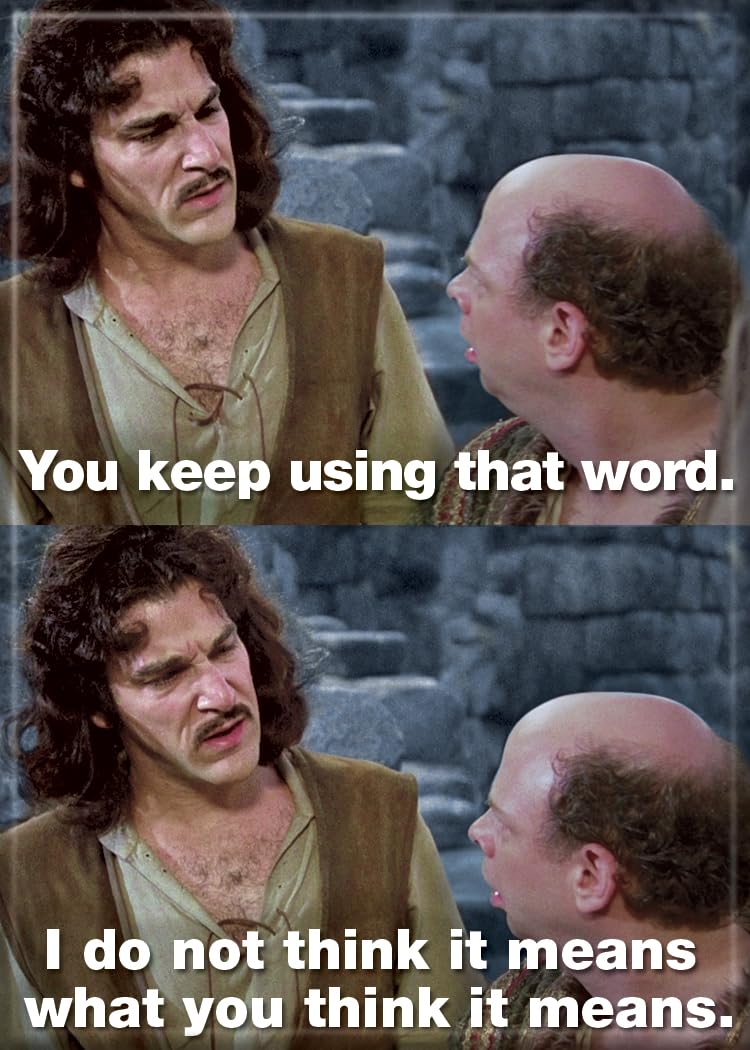You’re right that “murder” is a legal term, but whether abortion is morally equivalent to murder hinges on the science of what’s being ended. If science shows the unborn is a living human organism from conception... and it does... then abortion is the intentional killing of that human life. No. Wrong. Penal (i.e., criminal) statutes everywhere define "murder" with reference to the intentional killing of a person, not a collection of cells or "a living human organism." The law may not call it murder, but morality isn’t bound by legal definitions. "Morality isn't bound by legal definitions." What kind of mumbo jumbo is THAT?!! A far better restatement of your proposition is that, while what is "moral" and what is "legal" are not always the same, moral strictures and standards obviously infuse and inform the definition of what is "legal." And the fact that abortion has been legal, and supported as legal by a broad majority of society both here and in various other countries, suggests that society does not regard abortion in anywhere near the absolutist fashion that you do.
And here’s the inconsistency: under federal and state law, if a pregnant woman is murdered and her unborn child dies, it’s often prosecuted as a double homicide. The same life that counts as a victim in one context is dismissed as a “clump of cells” in another. That’s not a scientific or moral distinction... it’s a legal contradiction.
Got this from the Internet for you. Read and learn. In California, the killing of a fetus can be considered murder under Penal Code section 187(a), regardless of whether the fetus is viable. However, the fetus must have progressed beyond the embryonic stage, generally considered to be around seven to eight weeks after fertilization. This means that the law applies to fetuses that have started developing organs and structures beyond the initial embryonic period.
It's important to note that the law specifically excludes acts related to lawful abortions or those performed by a physician to save the pregnant person's life. Additionally, the law does not impose criminal liability on the person pregnant with the fetus for their own actions or omissions that may lead to the fetus' death. What?! A specific exception for abortion?! Imagine that.
Saying the unborn is “just a collection of cells” ignores the obvious: so is a toddler, so is an adolescent, so are you. See my comment above. The difference is stage of development, not nature. From conception onward, we’re dealing with the same continuous human life. Dismissing the earliest stages as “not human” doesn’t align with science or logic... it’s just rhetorical cover to avoid the moral weight of the act. A collection of cells may be a "living human organism," but it is not a person. I'm totally fine with aborting a collection of cells. Totally fine with it. No sleep lost. Plenty of folks who are virulent anti-choice (aka "pro-life") people are also pro death penalty. That seems morally inconsistent (and even logically fallacious) to me. Would that describe you as well? For the record, I am both pro death penalty (in appropriate cases) and pro choice.
Birth is significant legally, yes... but law is not the measure of when life begins. Governments also issue death certificates when a heart stops beating, yet no one argues that legal paperwork is what makes someone alive. Birth certificates mark entry into society, not the beginning of existence. Scientifically, life begins at conception... that’s why embryology doesn’t say “development begins at birth.” Embryology is the study of embryos, not live born human beings So the very title of the field of study you are focusing on undercuts your argument that embryos are "persons."
Your examples (birthdays, legal documents) are cultural conventions, not biological truths. Those cultural conventions arise out of biological truths. A fetus is not, and has never been recognized as, a person. Get over it. SMH ... We don’t celebrate “conception day” for the same reason we don’t celebrate “fertilization day” in a petri dish... but that doesn’t change what life is or when it starts. Even your own words concede that the unborn deserve “some measure of protection,” which undercuts your claim that they’re not meaningfully human until birth. If a fetus truly “does not approximate human existence,” why protect it at all? We appear to agree. A human embryo does not approximate human existence. So why protect it at all? That changes as the fetus has developed and is nearing birth. At that point, it more closely approximates human existence, and can perhaps be a viable person if born at that point. So it merits some additional protection. That works for me, and the majority of Americans. It apparently does not work for you. Such a pity ...
And the claim that unborn children “don’t interact in meaningful ways” is simply outdated. Modern science shows fetuses respond to sound, light, and touch in utero; they recognize their mother’s voice and even show preferences. C'mon now, Weapon_X. The "interaction" between a fetus and any person outside the womb is minimal at best. Fetuses are apparently capable of feeling heat, cold, and pain. And to the extent they do so, they do so at a stage of development where they are already entitled to legal protection. Your argument here is weak at best. The The womb is not a void... it’s the earliest environment of human life. To suggest existence only begins when lungs take in air ignores nine months of proven development. I'm not ignoring "Nine months of proved development." Those nine months are what turn a collection of cells into an actual person.
You’ve actually admitted the core point without realizing it... this entire debate hinges on whether the fetus is “another’s life.” Science has already answered that: from conception forward we’re dealing with a unique, living human organism with its own DNA, directing its own development. That’s not a “pantload,” that’s embryology. The only question is whether we, as a society, recognize that life as a person under the law. You're simply repeating yourself here, and it's boring.
The slavery comparison isn’t about identical circumstances, it’s about principle. Slavery and abortion are both examples of a stronger group defining a weaker group out of personhood to justify ending their rights or lives. Slaves were declared “not persons” for convenience; Wrong. Let's let Google explain it to you:
For the purpose of determining congressional representation and taxation, enslaved people in the United States were counted as "three-fifths of all other Persons" in the U.S. Constitution's Three-Fifths Clause (Article I, Section 2). This compromise, reached during the 1787 Constitutional Convention, counted three out of every five enslaved people in a state's population count. It is important to clarify that this clause did not declare enslaved people as 3/5ths of a human being in a general sense, but rather dealt specifically with their representation and taxation in government.
the unborn are declared “not persons” for convenience. The logic is the same even if the context differs. Frankly, I don't care if you call it "convenience" or not. Fetuses are not persons. Period.
And to your point about morality: legality doesn’t create morality. History is full of legal systems that enshrined grave injustice. The fact that abortion is legal in many places doesn’t settle whether it’s right... it only underscores that societies, like individuals, are fully capable of enshrining moral wrongs in law.
Sarcasm isn’t an argument. What I said isn’t “ex cathedra” or papal decree... it’s straight from Scripture and affirmed by the scientific consensus on when life begins. Psalm 139, Jeremiah 1:5, Luke 1:41... these aren’t my inventions, they’re God’s Word. You can dismiss it with “yada yada,” but that doesn’t erase the truth. A true follower of Jesus doesn’t get to redefine life or morality around cultural convenience.
Your opinions and disregard for human life don’t reflect Christianity... they reflect the world. That’s not discipleship, it’s play-acting. A true follower of Jesus submits to His Word, not reshapes it to fit convenience. So do you also regard the use of birth control as a sin? A mortal sin? Imagine the number of people who are living in sin, in that case. How about masturbation? If your view of the sanctity of life is as absolute as it appears to be, then you likely regard spermatazoa as sacred organisms as well. I sure hope you aren't killing your own sacred organisms (i.e., flogging the dolphin).



